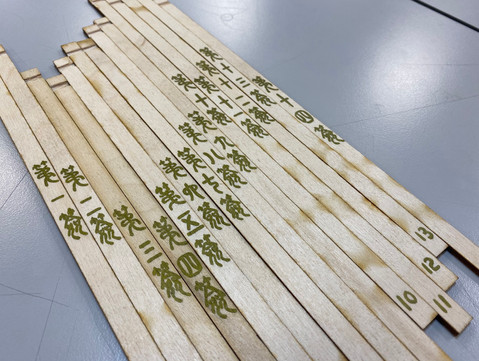Project 5#Consciousness
- Tracie Yang

- 2019年12月1日
- 讀畢需時 3 分鐘
已更新:2020年1月9日
The UX of consciousness.

Brief
Design an experience that explores the nature of consciousness.
Research Method
Artefact Analysis & Directed Storytelling
Brainstorm
This topic reminds us of superstition. Many superstitious things like constellations affect our thoughts subconsciously. People are willing to choose to believe it to calm down their mind. When superstitions point to something bad, people who believe that superstitions will be affected. Their mood would change, and the results of the things they care about will coincidentally deteriorate. Taking the traditional Chinese temple as an example, when life is facing a major decision or is in despair, people will think of going to a temple to draw a fortune stick and get instructions from the gods. No matter the result of things they care about is good or bad, it will somehow affect their behaviours through the subconscious mind. Therefore, the result could be changed by the influence of one's own subconscious mind.
Research
Directed Storytelling
We find several people and ask them to tell us stories about results change due to people's subconscious influence. The following is the diagram we made based on the interviews.

Artefact Analysis
We did some online research about traditional Chinese fortune stick. We went to a Chinese milk tea store for a copy of the entertainment version fortune stick.

Interim Outcome
We use card paper to make a prototype of the fortune stick. And write down explanations of the fortune on small pieces of paper.
We let our classmates pick up a stick and showed them the fortune of the stick they pick to see if this will affect their feelings.


After tutorial
After talking to our tutor, we think that the project can be made more refined.
More details should be added to the project instead of introducing a traditional superstition.
Definition
We want participants to feel that their subconscious is affected by the outside world without knowing.
Plans
We use triggers to influence participants' moods and make them think differently about the same things. At first, we created a sense of mystery by adding complex steps of getting the fortune paper. In this way, participants are more willing to believe in the results they get. Then play the same piece of audio that contains both positive and negative reviews. We ask participants to listen to this audio and tell us what they heard. And then, we let them choose if they heard more positive words or negative words. It verifies whether the influence of external judgment on the subconscious will affect human judgment.
Process
Fortune Teller Paper
We tried lots of materials to add a sense of mystery. We tried glue and sand at first and then tried iodine and starch.


At last, we found that the effect was not good, and we changed to use paper in different colours to distinguish between good luck and bad luck.

Audio
We recorded some audio of positive sentences and negative sentences and put them together.
Positive Sentences
1 I like your outfit.
2 You are amazing.
3 I like the way you are.
4 You are making a difference in the world.
5 You are beautiful.
Negative Sentences
1 Nobody likes you.
2 You are a mistake.
3 You are useless.
4 You are not even real.
5 Are you even alive?
Wood Stick and Wood Bottle
Through research, we found that wood products and vintage textures will increase user trust.
So we made the bottle and stick using wood materials in 3d workshop. And use a golden metal pen to mark the serial number with a retro font.
Final Product
Participants shake one of the sticks out of the bottle
During the presentation, we let our classmates shake one of the sticks and give them a piece of paper telling their luck of the day. And then they went inside a room with audio in it and voted at last.

Conclusion
From the final result, we can see that all the participants with positive fortune papers heard positive words.

Groupmates
Yitong
Yuki
Lily
Zain















留言